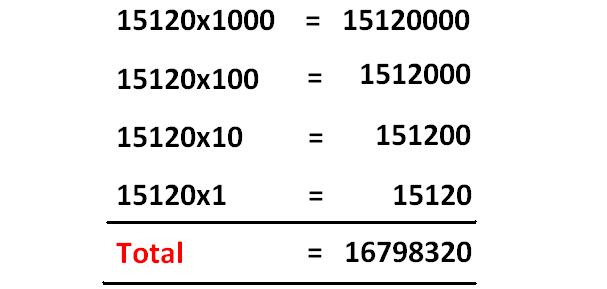SUM OF ALL 4 DIGIT POSITIVE NUMBERS WITH NON ZERO DIGIT
(without repetition)
Subscribe to our ▶️ YouTube channel 🔴 for the latest videos, updates, and tips.
Number of 4 Digit Positive Numbers with Non-Zero Digit
In all, there are nine different positive non zero digits.
They are
1, 2, 3, 4, 5, 6, 7, 8, 9
Since we are going to form four digit numbers, let us have four blanks.
____ ____ ____ ____
The first blank (thousand's place) has 9 options.(1, 2, 3, 4, 5, 6, 7, 8, 9).
If one of the nine digits is filled in the first blank, eight digits will be remaining.
So, the second place has eight options options and it can be filled by one of the eight digits.
After having filled the second blank, seven digits will be remaining.
So, the third place has seven options and it can be filled by one of the seven digits.
After having filled the third blank, six digits will be remaining.
So, the fourth blank has six options and it can be filled by one of the six digits.
The above explained stuff can be written as
9 x 8 x 7 x 6 = 3024
Therefore, the number of four digit positive numbers numbers formed using (1, 2, 3, 4, 5, 6, 7, 8, 9) is 3024.
Is it possible to write all the 3024 numbers and find sum of them in exam ?
Definitely, the answer for the above question is 'no'.
Then, is there any shortcut ?
Yes. To know the shortcut, come to know the value of K using the formula given below.

What does K do if one of the digits is zero?
Answer :
1. Each one of the non-zero digits will come K times at the first place (thousand's place, if it is four digit number).
2. The digit 0 will come K times at the second place. The remaining blanks at the second place will be shared equally by the non-zero digits.
3. The same process which is explained above for the second
place will be applied for the third place and fourth place.
What does K do if none of the digits is zero?
Answer :
Each one of the non-zero digits will come K times at the first
place, second place, third place and fourth place.
How is the above concept applied in our problem ?
In our problem, we have
K = 3024/9
K = 336
In total of nine different positive digits, none of the digits is 0.
So, each one of the nine different digits (1, 2, 3, 4, 5, 6, 7, 8, 9) will come at the thousand's place, hundred's place, ten's place and unit's place 336 (= K) times in the 3024 numbers formed using the nine different digits mentioned above.
Sum of Numbers at the First, Second, Third and Fourth Places
To find sum of all 4 digit positive numbers with non zero digit, we have to find the sum of all numbers at first, second, third and fourth places.
Let us find the sum of numbers at the first place (thousand's place).
In the 3024 numbers formed, we have each one of the digits (1, 2, 3, 4, 5, 6, 7, 8, 9) 336 times at the first place, second place, third place and fourth place.
Sum of the numbers at the first place (1000's place) :
= 336(1 + 2 + 3 + 4 + 5 + 6 + 7 + 8 + 9)
= 336 x 45
= 15120
Sum of the numbers at the second place (100's place) :
= 336(1 + 2 + 3 + 4 + 5 + 6 + 7 + 8 + 9)
= 336 x 45
= 15120
Sum of the numbers at the third place (10's place) :
= 336(1 + 2 + 3 + 4 + 5 + 6 + 7 + 8 + 9)
= 336 x 45
= 15120
Sum of the numbers at the fourth place (1's place) :
= 336(1 + 2 + 3 + 4 + 5 + 6 + 7 + 8 + 9)
= 336 x 45
= 15120
Sum of All 4 Digit Positive Numbers with Non Zero Digit (without repetition)

Explanation for the Above Calculation :
15120 is the sum of numbers at thousand's place. So 15120 is multiplied 1000.
15120 is the sum of numbers at hundred's place. So 15120 is multiplied 100.
15120 is the sum of numbers at ten's place. So 15120 is multiplied 10.
15120 is the sum of numbers at unit's place. So 15120 is multiplied 1.
Note :
The method explained above is not only applicable to find the sum of all 4 digit positive numbers with non zero digit. This same method can be applied to find sum of all 4 digit numbers formed using any four digits in which none of the digits is zero.
Subscribe to our ▶️ YouTube channel 🔴 for the latest videos, updates, and tips.
Kindly mail your feedback to v4formath@gmail.com
We always appreciate your feedback.
About Us | Contact Us | Privacy Policy
©All rights reserved. onlinemath4all.com

Recent Articles
-
SAT Math Practice Hard Questions
Feb 07, 26 08:28 AM
SAT Math Practice Hard Questions -
Digital SAT Math Problems and Solutions (Part - 1)
Feb 05, 26 09:37 AM
Digital SAT Math Problems and Solutions (Part - 1) -
AP Precalculus Problems and Solutions
Feb 05, 26 06:41 AM
AP Precalculus Problems and Solutions

